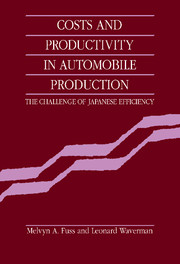Book contents
- Frontmatter
- Contents
- Preface
- Chapter 1 Introduction
- Chapter 2 International differences in output, productivity, and wages in the automobile industry: the 1950s to the mid-1980s
- Chapter 3 The cost-function approach to the analysis of cost and total factor productivity differences
- Chapter 4 Data base sources and method of construction
- Chapter 5 Empirical results: estimation of the cost function
- Chapter 6 Productivity growth in the automobile industry, 1970–1984: a comparison of the United States, Japan, Germany, and Canada
- Chapter 7 International comparisons of automobile industry cost and productivity levels: Japan, Germany, and the United States
- Chapter 8 International comparisons of automobile industry cost and productivity levels: Canadian with U.S., Japanese, and German production
- Chapter 9 Summary and conclusions
- References
- Index
Chapter 3 - The cost-function approach to the analysis of cost and total factor productivity differences
Published online by Cambridge University Press: 16 October 2009
- Frontmatter
- Contents
- Preface
- Chapter 1 Introduction
- Chapter 2 International differences in output, productivity, and wages in the automobile industry: the 1950s to the mid-1980s
- Chapter 3 The cost-function approach to the analysis of cost and total factor productivity differences
- Chapter 4 Data base sources and method of construction
- Chapter 5 Empirical results: estimation of the cost function
- Chapter 6 Productivity growth in the automobile industry, 1970–1984: a comparison of the United States, Japan, Germany, and Canada
- Chapter 7 International comparisons of automobile industry cost and productivity levels: Japan, Germany, and the United States
- Chapter 8 International comparisons of automobile industry cost and productivity levels: Canadian with U.S., Japanese, and German production
- Chapter 9 Summary and conclusions
- References
- Index
Summary
Introduction
As noted in Chapter 1, previous studies of international differences in cost and productivity for the automobile industry have in essence been accounting studies, and have not employed rigorous analytical methods. In this chapter we set out the theoretical basis for the analytical framework we will employ throughout the rest of our study. This framework is composed of an econometric cost function and the decomposition of cost and productivity proposed by Denny and Fuss (1983).
This methodology permits us to overcome two major shortcomings of previous studies: the inability to disentangle factor price effects from efficiency effects, and the inability to account correctly for short-run disequilibrium. The major source of disequilibrium that we are concerned with is due to variations in capacity utilization; these variations affect both unit costs and total factor productivity. Accounting for capacity utilization effects is particularly crucial in the automobile industry, an industry characterized by quasi-fixed factors (capital and part of labor) and product specific manufacturing facilities. Hence swings in consumer tastes among different products can lead to variations in capacity utilization that may greatly affect measured unit cost and productivity. In fact, the empirical results presented in Chapter 6 indicate that long-run total factor productivity growth during the period 1970–84 would have been overestimated by 22% in the United States and 20% in Canada if capacity utilization effects had not been accounted for.
There are two possible approaches to this problem.
Information
- Type
- Chapter
- Information
- Costs and Productivity in Automobile ProductionThe Challenge of Japanese Efficiency, pp. 64 - 79Publisher: Cambridge University PressPrint publication year: 1992
